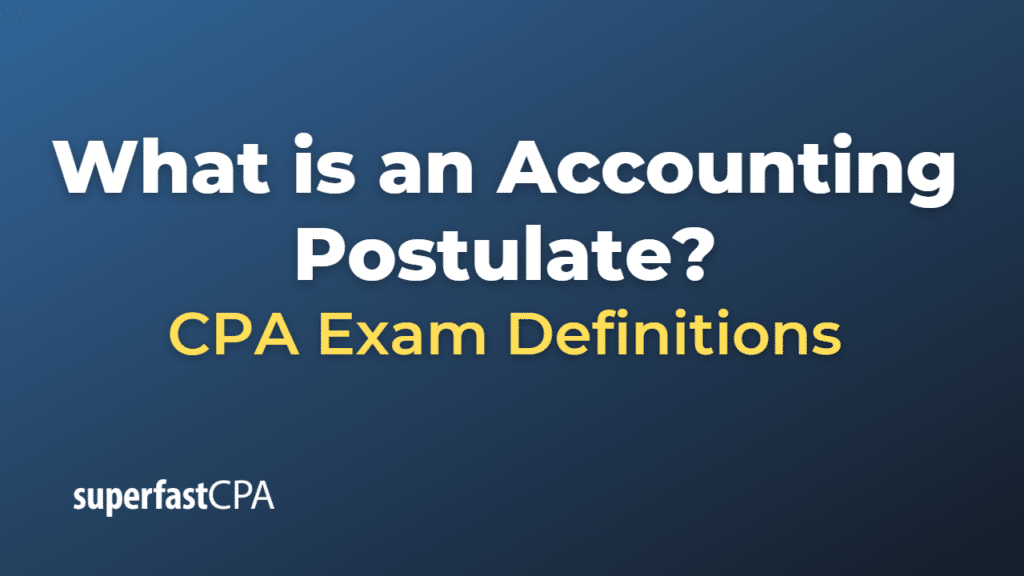Accounting Postulate
Accounting postulates, also known as basic accounting assumptions or fundamental accounting concepts, are the underlying premises that form the foundation of accounting principles and practices. They serve as a framework for the development of accounting standards and provide guidance for the consistent application and interpretation of these standards in preparing and presenting financial statements.
Some key accounting postulates include:
- Economic entity assumption: This postulate assumes that a business is a separate and distinct economic entity from its owners, and its financial transactions should be recorded and reported separately from the personal transactions of the owners. This assumption is crucial for maintaining accurate and reliable financial records for a business.
- Going concern assumption: The going concern postulate assumes that a business will continue to operate in the foreseeable future, without any intention or necessity of liquidation or significant scaling back of operations. This assumption enables accountants to prepare financial statements based on the premise that the business will continue to exist and meet its financial obligations.
- Monetary unit assumption: This postulate asserts that all financial transactions should be recorded and reported in a stable and consistent monetary unit, such as a national currency (e.g., US dollars, euros, or yen). This assumption allows for the consistent measurement and comparison of financial information across different time periods and companies.
- Periodicity assumption: The periodicity postulate assumes that a business’s financial activities can be divided into specific time periods, such as months, quarters, or years. This assumption enables businesses to prepare periodic financial statements and allows stakeholders to evaluate the company’s financial performance and position over time.
- Accrual basis assumption: This postulate states that financial transactions should be recorded when they are incurred (when the economic event occurs), rather than when cash is exchanged. The accrual basis of accounting provides a more accurate and timely representation of a company’s financial performance and position, as it takes into account both cash and non-cash transactions.
- Conservatism: The conservatism postulate requires accountants to exercise caution when making estimates and judgments in financial reporting, ensuring that potential losses are recognized as soon as they become known, while potential gains are recognized only when they are realized. This assumption helps to avoid overstating assets and income or understating liabilities and expenses, resulting in more reliable financial statements.
Accounting postulates serve as the foundation for the development and application of accounting principles and standards, providing a consistent framework for preparing and presenting financial statements that are comparable, reliable, and relevant to the needs of various stakeholders.
Example of an Accounting Postulate
Let’s consider a hypothetical example involving a small bakery, “SweetTreats,” to illustrate how accounting postulates are applied in a real-world context.
- Economic entity assumption: SweetTreats is owned by Jane Smith, who also operates the bakery. Even though Jane is the owner and operator, her personal financial transactions are kept separate from the bakery’s financial records. This separation allows for accurate reporting of the bakery’s financial performance and position, without any confusion or overlap with Jane’s personal finances.
- Going concern assumption: When preparing financial statements for SweetTreats, the assumption is made that the bakery will continue to operate in the foreseeable future. This means that assets, such as equipment and inventory, are recorded at their historical cost, rather than their liquidation value, and depreciation is calculated based on their useful lives.
- Monetary unit assumption: All financial transactions for SweetTreats are recorded and reported in US dollars, the local currency. By using a consistent monetary unit, the bakery’s financial information can be easily compared across different time periods and with other businesses.
- Periodicity assumption: SweetTreats prepares monthly financial statements to monitor its financial performance, as well as annual financial statements for tax reporting and other purposes. By dividing its financial activities into specific time periods, the bakery can analyze trends, make informed management decisions, and communicate its financial results to stakeholders.
- Accrual basis assumption: SweetTreats uses the accrual basis of accounting, which means that revenues are recognized when earned (e.g., when a customer purchases baked goods), and expenses are recognized when incurred (e.g., when ingredients are purchased or utilities are consumed). This approach provides a more accurate picture of the bakery’s financial performance and position, as it takes into account both cash and non-cash transactions.
- Conservatism: When preparing financial statements, SweetTreats’ accountant exercises caution in making estimates and judgments. For example, if there is uncertainty about the collectibility of a customer’s account receivable, a provision for doubtful accounts may be created to account for the potential loss. This approach ensures that the bakery’s financial statements do not overstate its assets or income, providing a more reliable representation of its financial position.
This example demonstrates how accounting postulates serve as the foundation for recording, measuring, and reporting financial transactions in a business context, helping to ensure that the financial statements are consistent, comparable, and reliable.













